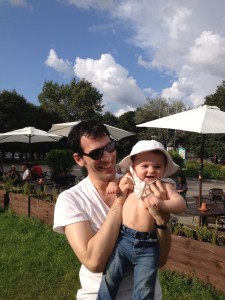The “Great Escape” Mr. Ben and I originally considered involved going away for six months or a year. We figured that while babygirl was between nine months and two years old, she would be portable — or, at least, as portable as she would ever be outside the womb. (Taking her anywhere, even as a small ten-month-old with few material possessions, is still reminiscent of the scene in the desert in Spaceballs, when the crew has to shlep all of the Princess’s matched luggage. It’s enough to make me nostalgic for the relative ease of pregnancy.)
Well, we had to scale back the dream a bit, for various very sensible reasons. But the dream lives. For an entire year, I will focus on writing: the manuscript of the novel I’m currently working on, a revision of the novel I wrote when I first came to New York, perhaps more short pieces for the Internet, since the thrill of contributing to Slate and the Hairpin and those kinds of places has yet to wear off. To start the year off with a bang, I signed up for the Summer Literary Seminars program in Vilnius, Lithuania, to study fiction with Jami Attenberg in the mornings and non-fiction with Alex Halberstadt in the afternoons. Since both of these writers are Jews living in Brooklyn, it feels appropriately inefficient and complex — you know, Soviet! — to come halfway around the globe to an Eastern European capital from which my ancestors fled in droves to take workshops with them.
Best of all, Mr. Ben knit together seven weeks of leave from his job of vacation time and FMLA leave so that he could come too and bring babygirl. (By contrast, I parted ways with my job, where I spent four interesting and meaningful years and still have coworkers I care about.) After my two weeks at SLS, we go to Britain in order to fulfill a dream of Mr. Ben’s (about which more later), and then the coast of Spain, where family friends have an empty house that they have offered up. Old-world capital, English countryside, Mediterranean coast: this is “Eat, Pray, Love” done the Balynker-Gloom way. As my Aunt Marjy put it, Lara’s “How I Spent My Summer Vacation” essay is going to be the best ever!

Our passports got stamped in Copenhagen, where we spent an endless layover thinking wistfully about the sophisticated Scandinavians — so clean and organized, and yet so child-friendly! — and whether we were crazy to take an infant to the Baltic. Then a plane as long as two minivans lashed together whisked us away from Danish paradise and dropped us off on a rainy Lithuanian tarmac. The weather only got soggier as we made our way to the apartment we secured on AirBnB, and babygirl only got more upset as we set up her travel crib and put her in it for the first time. (Eighteen hours on the road and all I get is this big mesh box?) There were bright spots even then, though, specifically the apartment, which reflects the taste of its owner, a talented graphic designer. It’s hard to be unhappy in a place with a bright yellow vintage fridge.
The next day the sun came out, as cheerful as a bright yellow vintage fridge, and we ventured forth into a walkable and surprisingly lovely, low-key city that didn’t feel too different, after all, from Copenhagen. We’ve met a couple of motorcycle-riding Lithuanians who have a daughter Lara’s age, and a plethora of poets (“Which MFA program are you in?”) with inner-arm tattoos, which seems to be the thing these days, like side shaves. We’ve overheard some live foreign-language Christian rock (“Yesu, Yesu …”) and lots of recorded hip hop, which is a bit jarring in a country full of pale blond people, and eaten lots of dill and some ham already by mistake and really good Latvian yogurt.
Even my ancestors would, I think, appreciate this town. I can hear them crowded around me as Lara plays in the sandbox at the heart of what was once the sprawling Jewish ghetto: “Hmph. Not too bad, when the clouds disperse. It has potential.” And then, inevitably, “Her hat! Make sure she keeps her hat on!”


